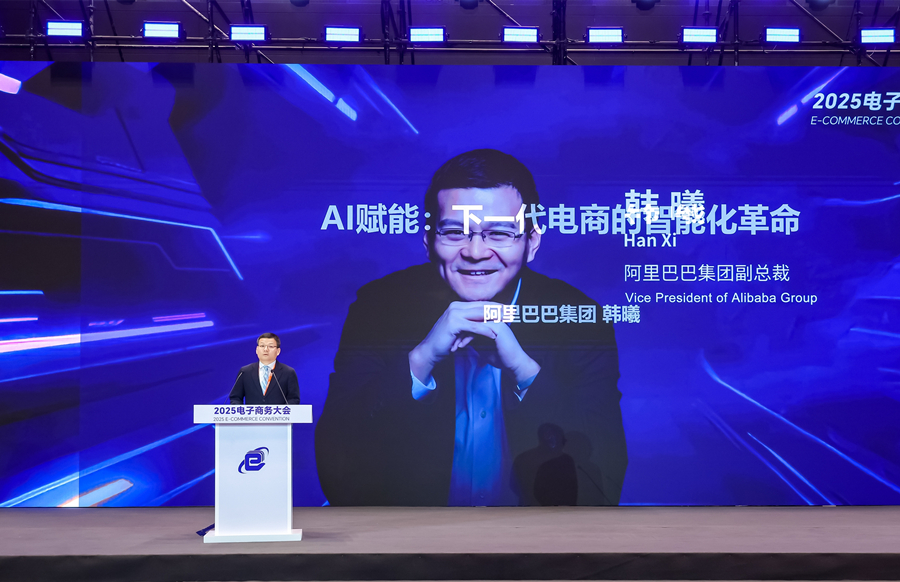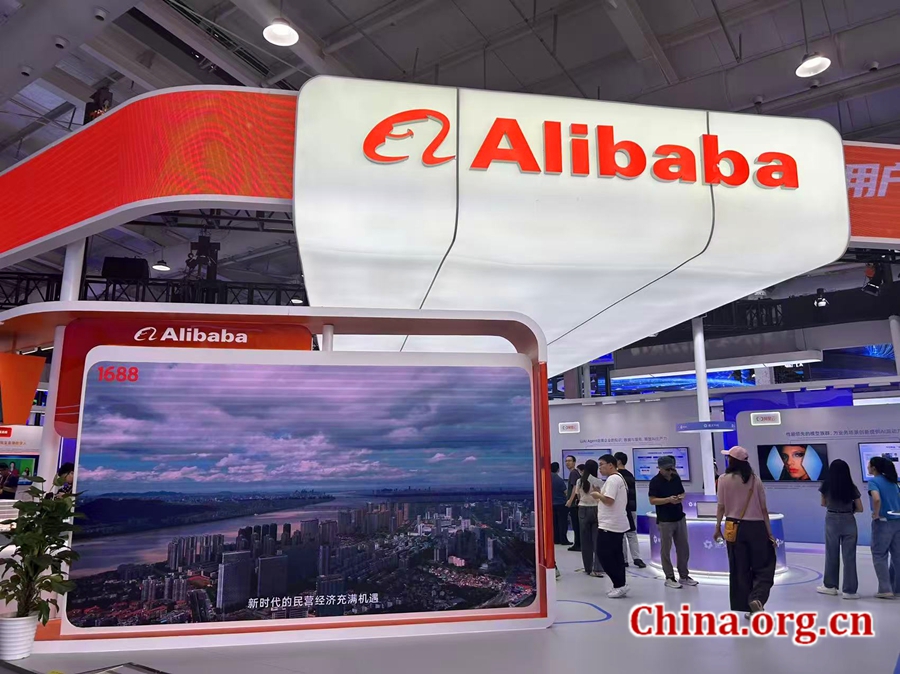Alibaba Group Vice President Han Xi said last week that artificial intelligence is transforming into the backbone infrastructure of e-commerce, creating new opportunities for businesses and consumers.

Han Xi, vice president of Alibaba Group, addresses The E-Commerce Convention 2025 during the 2025 China International Fair for Trade in Services in Beijing, Sept. 10, 2025. [Photo courtesy of Beijing E-Commerce Association]
"Just as the emergence and widespread application of major technological innovations in each technological revolution have driven profound transformations in the economy and society, the most widely discussed topic today is the rise of a new generation of technology represented by AI," Han said at the 2025 China International Fair for Trade in Services in Beijing.
"At the same time, AI technology itself is achieving rapid breakthroughs and gradually progressing toward artificial general intelligence," he added.
Alibaba Cloud runs the world's largest cloud platform by business scale, with technology spanning chips to AI applications, Han said. The company's open-source Qwen models have generated over 140,000 variants and attracted 16 million developers through its ModelScope community.
"AI has created broader opportunities for the development of all industries," he noted. "This can be summarized as two core strengths: creativity and productivity. AI demonstrates remarkable capabilities in unlocking creative potential, providing powerful support for generating innovation and ideas. At the same time, it significantly enhances labor efficiency while reducing unit output costs, delivering substantial effects."
The technology's impact is particularly evident in e-commerce, where AI applications span the entire value chain from product development and supply chain management to marketing and customer service, according to Han.
"Whether on the front end or back end, AI enables faster, more efficient content creation, more scientific business decision-making and more effortless daily operations. It is playing an increasingly vital role throughout the entire e-commerce process," he said.
Taobao, one of Alibaba's consumer e-commerce platforms, serves over 4 million merchants with AI tools that cut costs by 90% in marketing and customer service, Han stated. Alibaba.com saw AI usage jump 44-fold year-on-year among 140,000 weekly active merchants, outperforming 80% of human sales staff. Meanwhile, consumer features like AI search, virtual try-ons and home visualization personalize standard services for consumers.
"By analyzing lifestyle needs, problems, and scenarios, AI will profoundly transform how users interact with products and merchants," he said. "It will evolve from being a tool into a versatile assistant in daily consumption, and may even become our intelligent companion. Looking to the future, if every user could have a considerate and secure AI shopping assistant, providing access to all connectable resources anytime and anywhere, it would seamlessly fulfill our potential consumption needs."

The Alibaba Group booth at the 2025 China International Fair for Trade in Services in Beijing, shown on Sept. 14, 2025. [Photo/China.org.cn]
He added that Chinese internet platforms now lead globally, with e-commerce sites building advanced technology through diverse business applications.
"We can support high-concurrency transaction demands under complex promotions, possess path optimization technology with latency below one millisecond, and have established a relatively mature warehousing and delivery network. These form the foundational infrastructure supporting large-scale consumption platforms," he noted. "With AI technology advancing rapidly, it provides sustained momentum for innovation in the consumer industries. We believe the AIGC(AI-Generated Content) era may give rise to new AI-native forms of e-commerce."
Han predicted that AI will drive integration between e-commerce and local retail while building ecosystems that integrate products with services.
"Alibaba hopes to collaborate with partners to create an open and inclusive new digital economy ecosystem, allowing technology to continuously empower business and daily life," he said.


 Share:
Share: 




 京公網安備 11010802027341號
京公網安備 11010802027341號